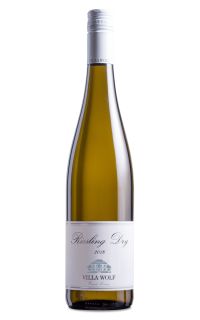The J.L. Wolf winery, which has a long history dating back to 1756 and is located in the Pfalz region of Germany, was acquired by Ernst Loosen in 1996. According to the designs of the Karlsruhe architect Friedrich Eisenlohr, Villa Wolf is a rural home in the Italian style that was finished in 1843. The acquisition of J.L. Wolf (now known as Villa Wolf) brought back memories for Ernst Loosen. The chance to revitalize a winery with a good supply of vines in ideal settings emerged, much like with the Dr. Loosen Winery. Both wineries are in unique regions: Dr. Loosen is in Bernkastel on the Middle Mosel, which has the highest density of premium vineyard sites.
The single vineyard properties are found in the northern Pfalz towns of Wachenheim and Forst, which border the Mittelhaardt. Just the ripe and nutritious grapes are used to create dry wines at every single vineyard location, which are all carefully hand-picked. The Middle Haardt's distinct regional climate, mineral-rich limestone, basalt, and sandstone soils, and the vines' extensive age are the cornerstones of the vineyards' terroir. The Royal Bavarian Government developed a vineyard category based on the land tax in 1828, which is comparable to the Grand Cru scheme in Burgundy, where the Villa Wolf vines are located, recognising their significance for the creation of exceptional wines even before then.
The property's vineyards have also applied for organic certification, which is a procedure that will require many years to finish and would make 2022 the inaugural year with official organic certification. Patrick Moellendorf, the person in charge of growing grapes and winemaking at this winery since 2011, is responsible for this. The idea behind producing exceptional wines in the family vineyards is to blend sustainable, organic farming techniques with careful fruit treatment and conventional, simple winemaking. Their fine wines have long represented fantastic value in terms of taste, consistency, and varietal accuracy.
https://villawolf.com
Find out more
















